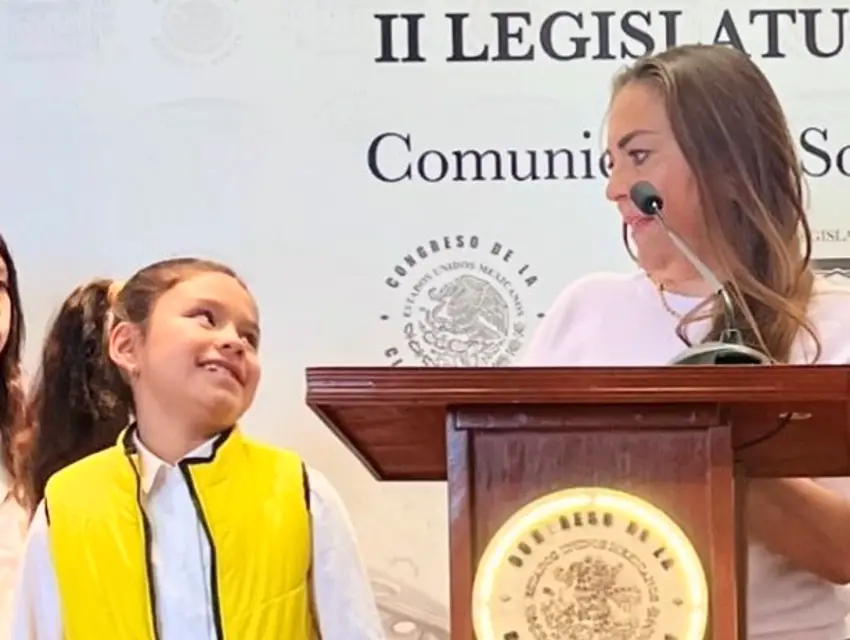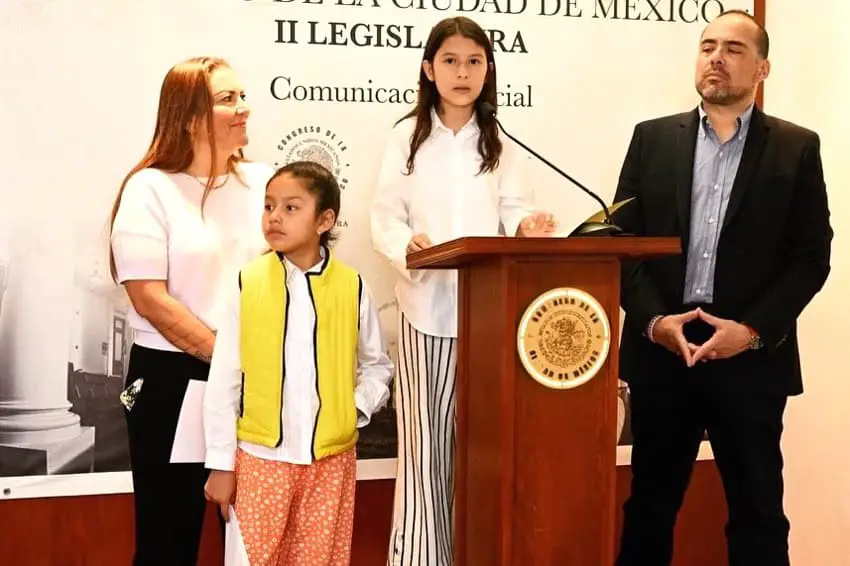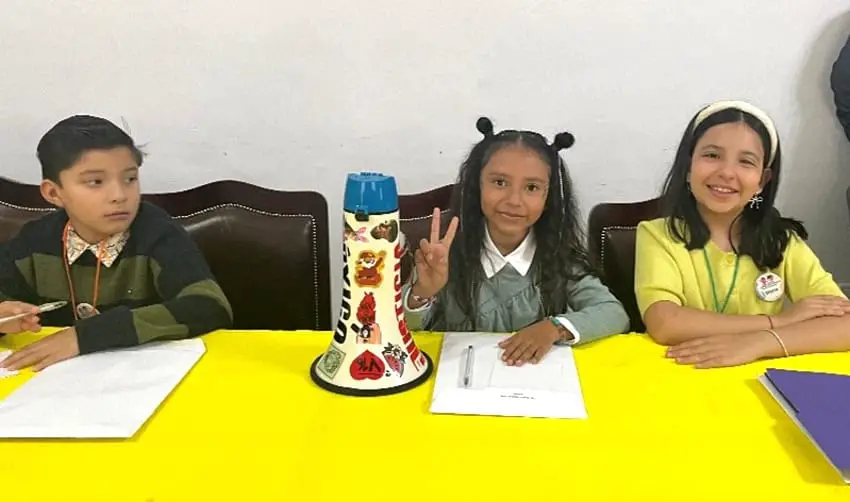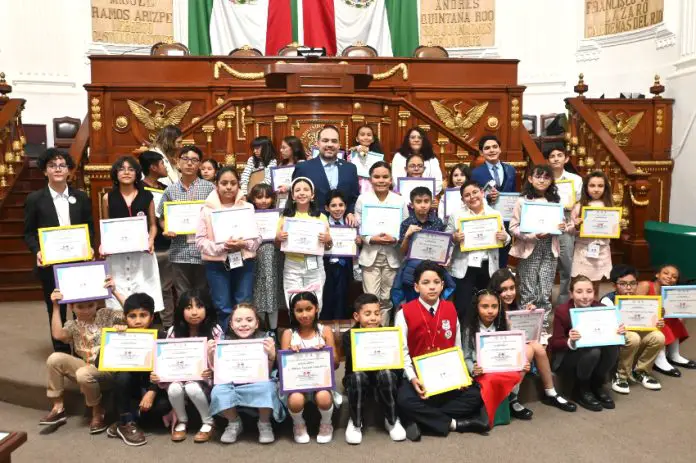This summer, this idea — letting children be in charge of Mexico City’s legislature for a day — became a reality.
Over 30 children, ages eight to 12, flooded into Mexico City’s Congress, dressed in suits and formal wear, and took the seats of city legislators.

Polimnia Romana, president of the city’s congressional board of directors and member of the Democratic Revolution Party (PRD), hosted the annual Children’s Parliament on July 22.
Uplifting children’s issues is a priority for Romana, who chairs the Commission on Child Development Affairs. In addition to the Children’s Parliament, Mexico City holds parliaments for teenagers, women, people with disabilities, and people who identify as LGBTQ+.
Studies of children participating in these parliaments around the world have shown benefits in children’s confidence, self-esteem and personal skills, as well as in their encouragement to engage in future civic roles and initiatives.
Some are skeptical of the impact that such parliaments have to shape policy outcomes, but the importance of creating a space for children to make their voices heard cannot be overstated.
🎉👧🏽👦🏻¡Las niñas y los niños se convirtieron en diputadas y diputados por un día en el Congreso de la Ciudad de México! 🌟
Durante el Parlamento de la Niñez 2024, compartieron sus propuestas para garantizar los derechos de la infancia.
👏¡Gracias por su increíble labor y… pic.twitter.com/NiHt6dLmtR
— Congreso de la Ciudad de México (@Congreso_CdMex) July 23, 2024
This short video shows moments from the Mexico City Congress Children’s Parliament in July.
The children participating seemed to share Romana’s values of uplifting young people’s voices.
In her campaign speech for a position on the congressional board of directors, María José (or Majo), age 11, proclaimed, “I want to hear everyone’s opinions and try to consolidate them into a single voice so that everyone can share what we are striving for, because often children are not listened to. But together, we can do it.”
She received the most votes and was elected to serve as the president of the board of directors for a day, taking Romana’s usual seat overlooking the congressional chambers.
Once the board of directors called the session to order, one by one the children came before the parliament and delivered proposals, before placing their folded speeches in a “treasure box” below the pulpit.

The children’s ideas spanned issues from migration, gender equality and cybersafety to climate change. Their range and ingenuity show that the youngest citizens have some creative solutions for the city’s future.
The children’s proposals not only focused on solving problems but also engaging in community building and addressing financial sustainability.
Sebastián, age 10, delivered a proposal to revamp public libraries arguing, “Children would enjoy libraries much more if they had more recently published books, couches, tablets, computers, learning platforms, screens, exclusive bathrooms for children, and robotics equipment.”
Sebastián offered concrete ways to realize his vision: “I propose that cafes be allowed next to libraries and that part of the profits be used for the libraries, and the spending for libraries be decided in a council with children and neighbors.”
The press, adult lawmakers and parents all seemed surprised to hear this level of strategic thinking — addressing not only how to build community buy-in around places of learning but also how to generate sustained income for a community resource.
Several children presented proposals to address the climate crisis. Alessa offered strategies to tackle the city’s water shortage. She explained that “the Rainwater Harvesting Program in Mexico City only benefits some of … [the] people, and more than 22 million people live here.”

To address the huge gap, she proposed “that all schools have a rainwater harvesting system and that we are also taught how to build them, fix them if they fail, and repair minor leaks.”
She further called for “shopping centers to have a rainwater harvesting system and to donate some of their water to schools and hospitals. New buildings should have rainwater harvesting systems to use for irrigation, washing floors, and cleaning windows.”
Like Sebastián, Alessa wanted to educate and empower other children as agents of change. She saw her solutions for addressing the climate crisis as part of building a thriving society.
The students modeled compassionate leadership by empathizing with other children on issues such as migration.
Erin explained that there are “700 migrants, including many children, living in a camp on the streets where I live, in the Vallejo neighborhood.”
She called on the city government to ensure that “programs and services promote the human rights of migrant children” and “ensure the prevention of child labor exploitation.”
In addition to protecting migrant children’s human rights, Erin also called on the city to “install new playground equipment” to protect the children’s right to enjoy being kids.
Finally, children shared personal experiences on issues such as conditions in foster care.
One child, age 12, said “I live in a vulnerable situation. Many times, people from social services come to my home. They are supposed to help children in street situations, but instead of helping us, they separate us from our moms and dads. When we are taken to foster homes, we are bathed with cold water, given spoiled food, and mistreated. We find ways to escape so we can return to our parents.”
He made a powerful request: “Today, I’m here because I wish the government could provide us with a home, food, and jobs for our parents so that we can live better.”
The only way to understand how to truly build brighter futures for children is to honor their experiences and uplift their dreams.
Not many adults in power create powerful platforms for children as young as eight to make their voices heard.
In her closing message, Romana proclaimed, “You have the right to be free, to live a life free of violence, to live in a healthy environment, to have your opinions heard and taken into account, to have your ideas respected — in short, you have the wonderful right to be absolutely happy.”
The Mexico City Children’s Parliament shows that children are ready to assert their roles as active participants in democracy. The voices of the youngest visionaries seed hope for a thriving city, where children’s dreams could invite new possibilities for happiness.
Becki Marcus is a freelance journalist and video producer based in Mexico City, reporting on issues such as feminism, public health, and democracy. Her articles have been featured in Ms. Magazine and North American Congress to Latin America.
